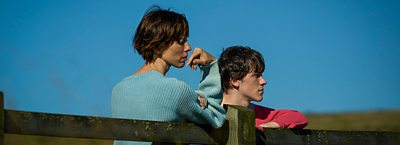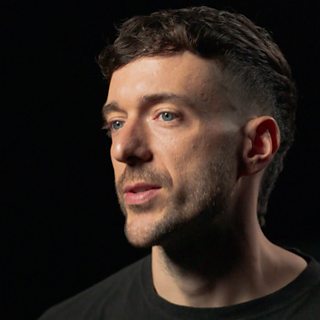The Listeners is based on the novel of the same name by Jordan Tannahill, who has also written the adaptation. Find out more about the story, its inspiration and themes below.
Watch The Listeners on ΒιΆΉΤΌΕΔ iPlayer on Tuesday 19 November from 6am and on ΒιΆΉΤΌΕΔ One from 9pm that night.
Why did you originally decide to write The Listeners as a novel, before you adapted it for the screen?
The story was one that that I had lived with for a long time. I wrestled for many years trying to find the proper format in which to tell the story. And so initially, as I developed the work, I was thinking, maybe it'll be a play (I work also as a playwright). But the story just felt too large, too sprawling for that form. Once I understood that it had to be a novel, we had to really be within Claire's interior perspective and explore the story through the first person, that's when it really unlocked itself. And I think , the director of the TV adaptation, has done an extraordinary job of retaining that interiority of Claire's perspective, as she begins to lose grip, perhaps, on what is real and what isn't, and when she finds refuge with the other listeners. I think that's been quite beautifully preserved in this series.
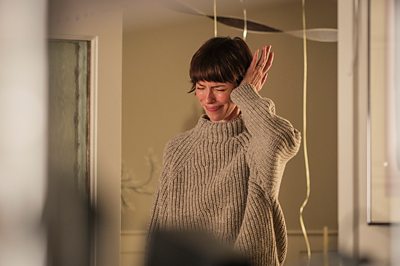
Which themes in the book do you think resonated most with readers?
Hopefully the ones that intrigued me about the story in the first place. The hum itself is an actual phenomenon that does exist in the world. It's a global phenomenon that people have reported experiencing (or suffering from, depending on their perspective), in disparate places around the world for a few decades now. They report it as a sort of low frequency hum, or vibration, almost at the very edge of human hearing. There's no communally agreed upon attributable source for the sound, which really intrigued me.
I think what initially drew me to the story, and I think what has drawn readers to the story, is that initial mystery, the idea that there might be something in the world that is yet to be explained by science or by logic. There are many scientific theories as to what the hum could be, and many of them are quite poetic in nature. There's a team of French scientists, for instance, who believe that the hum could be caused by ocean waves, concussion against the continental shelf creating vibrations that we then hear miles and miles away. There are some people who believe that it is a geo-scientific phenomenon, which intrigues me - the idea that there are aspects of the world of nature that we don't yet understand. There are also theories that suggest that we could be living in conflict with nature. So, for instance, the sound could be the electric grid or electromagnetic waves caused by 5G and so forth. That also intrigues me; the idea that our built environment is afflicting us.
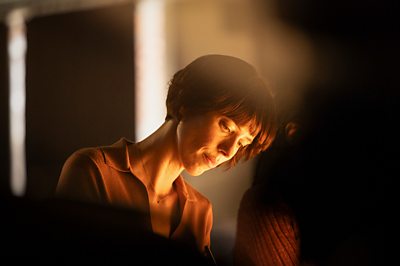
What are some of the other themes that you wanted to bring through in the story?
Deeper than that, what intrigues me about the story is that question of, do we have a shared reality in society? I think we have seen in our political arena the repercussions of large sections of the population living in two or multiple totally different realities. And I think Claire finds herself living in a different reality, accepting a different set of facts and truths from her family and her colleagues. And so, for me, the story really gets at the nature of belief and even conspiracy culture. The idea of, why is it that some people are drawn to potentially what seem like quite extreme forms of belief? The novel really interrogates the intersection between belief, conspiracy culture and mania and how these things rub up against each other and are really playing upon our lives at the moment.
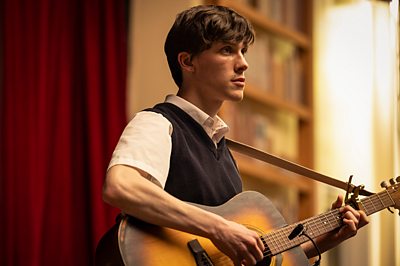
What do you think will appeal to viewers about the themes behind the story?
I think we should be left asking, is this a cult or is this just a group of concerned neighbours? Is this like a neighbourhood association or almost like a book club? Or maybe like a yoga group, or maybe it is actually a cult? I'm interested in these pseudo-truths and pseudoscience and the ways in which everything from health care regimes, self-help groups and those kinds of things have their own truths. I think βwhat is truth?β is a very contested territory at the moment. I'm interested in that in relation to spirituality, politics, our personal lives, how truth is a battleground even within a family. How a husband and wife might feel utterly differently about a shared set of experiences.
Also, there's something I think that's quite profound about experience. I think what really drew me to the original story of the hum is the idea that there might be one person within a family who hears it, and no one else does. The isolation of that, the pain of that, the psychic suffering of that, and the ways in which that begins to fray the bonds of a family and begins to alienate you from the people you love the most and trust the most, and vice versa. That, for me, can be a metaphor of the ways in which a conspiracy can take someone from the bonds of their family or faith or a political ideology - the ways in which different truths begin to fracture a family unit.
There's also something very specifically historical and political, I think, about the ways in which women's symptoms and the ways in which women's expression of their experience have been denied or dismissed. I think Claire is somewhat operating in that archetype as well, someone who is experiencing these things that are real to her, that she's being very much physically and mentally affected by and is being continually dismissed and unheard.
Who listens to us in our in our times of need? And what is it to listen? How do we listen to someone else's truth that isn't our own? Claire finds a kindred spirit in a very unlikely place, which is with her student Kyle, who not only also hears this sound, but also hears her and listens to her.
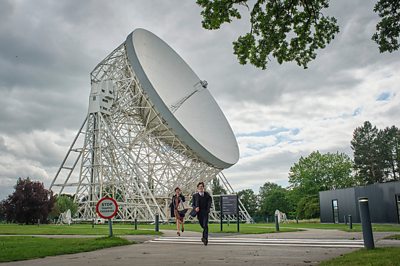
What is intriguing about Claireβs character and the journey she goes on?
I really empathise with Claire as a character insofar as I see her as someone who is seeking knowledge, seeking an answer to what afflicts her, but also she's seeking transcendence. She's seeking a powerful experience in her life. She's seeking almost a spiritual experience through trying to get to the bottom of what this hum is and accessing something quite profound in the process.
I, like Claire, see myself as a bit of a natural sceptic. Someone who is naturally a bit creeped out by groupthink or what I perceive to be a communal sort of ecstasy even, that might exist in spiritual or religious contexts. So, I have partly written my own scepticism into Claire's character and see her on this journey from scepticism to a sort of submission, not so much to belief, but to total experience and total sensation.
I think, hopefully, a number of readers of the novel saw themselves in Claire's character, whether they're a woman or not. I think she's someone who is seeking something greater than the somewhat small life that she's otherwise been living up until that moment.
I finished this book in lockdown, so I was thinking a lot about the nature of community and isolation and the power of human contact. I think one of the fundamental aspects of spirituality is the formation of community and the rituals of that community. I think we all, in some way, need rituals, we need community in our lives. I think Claire is finding herself really in need of community, specifically a community of people who share her very singular experience and who can listen to her and who she can make space for. I think that desire to find your clan, to find your tribe, is something that I'm seeing a lot of right now online, for instance. I think the great draw of conspiracy culture is the idea that, oh, I'm not alone. I'm not just sitting in my basement. Actually, I'm part of this tribe, this clan, this movement. Hundreds, possibly thousands of other anonymous souls around the world share this very singular belief that I do. My truth is not wrong, and itβs not individually held.
I'm really interested in how people find each other and build their own truth together. It feels like both a necessary and potentially scary kind of phenomenon.
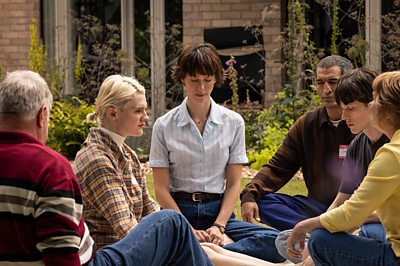
How difficult was it to transfer The Listeners from novel to television?
I think one of the central questions around the adaptation was how do we depict the hum? Do we just simply hear the hum, the whole show? Is that even possible? Can an audience endure that? Is that interesting? How do we depict it visually? How do we depict Claire experiencing the hum visually and more than that, how do we depict its wonder? And how do we depict transcendence and rapture and ecstasy on screen in ways that might be unexpected and that might seem akin to spiritual or even sexual experience, but are somehow uniquely its own thing.
Janicza (the director) was really instrumental in helping me think more visually about the work. I think when you live with a story for so many years in your head, as I did with this one, it's easy to get locked into how the story goes, who the characters are, and really, it was such a joyful experience, realising that the story is actually more expansive than what is contained within the novel and being able to give more space, for instance, to Paul's experience (Claire's husband), or the perspective of Ashley, her daughter. I think it's so much stronger for it. I really do think that the series is a real strengthening of the story and of the initial proposal that exists within the novel.
The whole team brought such a specific stylisation as well to the world, which I think is really special. Janicza was really keen to situate the story in a time and space that was slightly liminal, slightly between anything that we could quite identify. So, it's somehow in the present, but also perhaps in the 1990s. It sort of feels like, oh, this is a suburb, I know, but also, I've never seen before. It feels surreal and also so familiar. It feels like it's middle England, but also somewhere altogether different. I think that's a very rigorous design by the whole team.
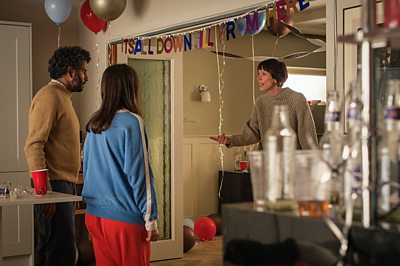
How did you go about adapting the location of The Listeners to the UK?
The book is set in North America, but we decided to relocate it to Britain, to a kind of nondescript, non-specified, Midlands suburb. The process of finding the sort of equivalences in the book has been quite fun. For me, the story though, does exist almost in the world of parable or fable, so it does feel like it can be transferred. In fact, there was an opera of the story that was set in Norway.
I think there is something that is universal, though I'm a bit hesitant to use that word, but there's something that certainly resonates with people in many different cultures about Claire's story. It sort of transcends its initial North American context.
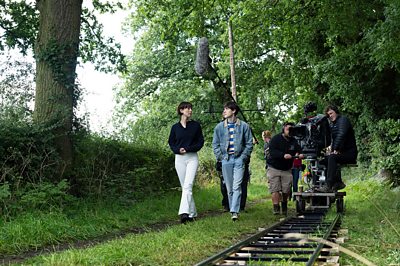
Whatβs the best writing advice that youβve been given?
This is a well-known axiom, but 'show, don't tell'. Especially when you have such extraordinary actors like we do, there's a lot that can be communicated in a glance. There's a lot that can be communicated in silence. And I think there's a tendency, especially coming from the world of theatre, to overwrite certain scenes. Theatre is a space of debate, and I think so much of that can happen through more visual means in cinema and television.
Show, donβt tell. Be concise. And trust the intelligence of the viewer. I think that it's really important never to underestimate our capacity to apprehend the subtleties or the insinuations or the multi-layered nature of a moment. Not to have to present it all on a big shiny platter.
What advice would you give to other writers?
Write your big idea now, don't wait for it. The best time to make your best work, or your most ambitious thing, or your most bold, outrageous thing is now. I think thatβs been the philosophy of everyone involved in The Listeners. Weβve tried to make the boldest, most singular show that we can.
-
Watch The Listeners on ΒιΆΉΤΌΕΔ iPlayer
-
Read more interviews with the cast and crew of The Listeners on the ΒιΆΉΤΌΕΔ Media Centre
